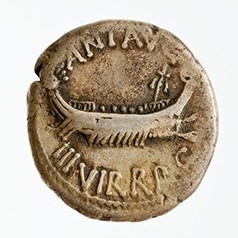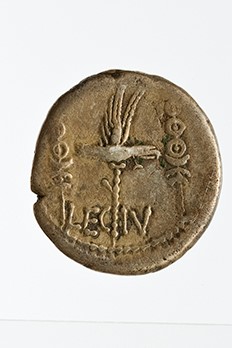Title: Denarius of M. Antonius - 1968.03
Acquisition number: 1968.03
Author or editor: Beryl Rawson
Culture or period: Roman Republic
Date: 32-31 BC
Material: Metal - Copper-silver alloy
Object type: Coins - Roman
Dimensions: 17mm (w)
Origin region or location: Greece
Display case or on loan: 7
Keywords: Coin, denarius, Roman, Republic, Antony, Patrae, Achaea
Sear, D.R., Roman Coins and their Values 5 vols (London, Spink, 2000-2014) 1479; Crawford, M., Roman Republican Coinage 2 vols (Cambridge, Cambridge University Press, 2011) 544/18; Sear, D.R., The History and Coinage of the Roman Imperators (London, Spink, 1998) 354; Grueber, H.A., Coins of the Roman Republic in the British Museum 3 vols (London, The Trustees of the British Museum, 1910; rev. edn London, 1970) East 195/196; Seaby, H.A., Roman Silver Coins (London, B.A. Seaby, 1967) 32 (Patrae? 32-31 BC); Sydenham, E. A. The Coinage of the Roman Republic (London, Spink, 1952; (Sanford J. Durst repr. 1976) 1219.
1968.03
Denarius of M. Antonius
3.596 g. 32-31 BC
Obv.: Ship rowing r., with standard (?) at the prow. Above, ANT(onius) AVG(ur); below, III VIR R(ei) P(ublicae) C(onstituendae).
Rev.: A legionary eagle between two standards. Below, LEG(io) IV.
Antony uses the title of ‘triumvir for setting the state in order’, although the powers of the triumvirs (Octavian and Antony — Lepidus had been expelled in 36 BC) had expired at the end of 33 BC. Octavian does not seem to have used the title after 33 BC, but for Antony it was the only claim to legitimate Roman authority that he could make. His relations with Octavian had worsened, and in the campaign leading up to the battle of Actium he minted a great deal of coin in order to pay his troops. Much of it was struck specifically for individual legions, as this piece was. The ship on the obverse indicates the importance of sea power in the campaign.
This is the celebrated “legionary coinage” honouring 23 legions as well as praetorian cohorts and cohorts of speculators. It was probably produced at Patrae prior to the battle of Actium to pay his troops. The metal used for these issues contains less silver than normal. For this reason these coins survived much longer than usual.
Marcus Aurelius struck a restoration issue of this coinage in the second century AD.
Sear, D.R., Roman Coins and their Values 5 vols (London, Spink, 2000-2014) 1479; Crawford, M., Roman Republican Coinage 2 vols (Cambridge, Cambridge University Press, 2011) 544/18; Sear, D.R., The History and Coinage of the Roman Imperators (London, Spink, 1998) 354; Grueber, H.A., Coins of the Roman Republic in the British Museum 3 vols (London, The Trustees of the British Museum, 1910; rev. edn London, 1970) East 195/196; Seaby, H.A., Roman Silver Coins (London, B.A. Seaby, 1967) 32 (Patrae? 32-31 BC); Sydenham, E. A. The Coinage of the Roman Republic (London, Spink, 1952; (Sanford J. Durst repr. 1976) 1219.

